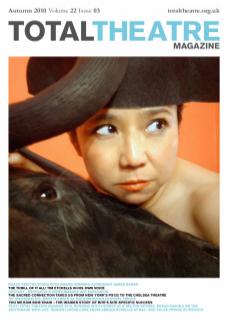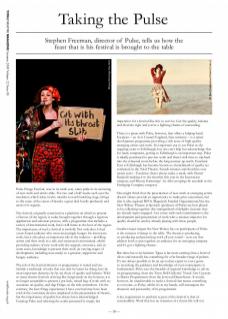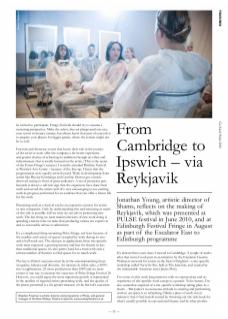Pulse Fringe Festival, now in its tenth year, takes pride in its nurturing of new work and artists alike. For two and a half weeks each year the incubator, which takes twelve months to reach hatching stage, brings to life some of the rarest of breeds; a great deal locally produced, and most of it organic.
The festival, originally conceived as a platform on which to present a flavour of the region, is today brought together through a rigorous application and selection process, with a programme that includes a variety of international work, but is still home to the best of the region. The importance of such a festival is twofold. Not only does it feed a new-found audience who seem increasingly hungry for innovative work, but it also plays an important role in the industry – profiling artists and their work in a safe and structured environment, whilst providing makers of new work with the support, resources, and, in some cases, knowledge to present their work (at varying stages of development, including tour-ready) to a genuine, supportive and hungry audience.
The job of the festival director or programmer is varied and can include a multitude of tasks that can only be learnt by doing, but the most important elements by far are those of quality and balance. With so many theatre festivals arriving like fairgrounds on the horizon, it is no longer acceptable to present a pot-luck, mixed bag of work with no assurance on quality, and slap Fringe on the title somewhere. On the contrary, the best fringe experiences I have ever had may have been void of the customary devices employed in the presentation of theatre, but the importance of quality has always been acknowledged. Curating Pulse and selecting the works presented is tough, but imperative for a festival like this to survive. Get the quality, balance and diversity right and you’ve a fighting chance of succeeding.
There is a given with Pulse, however, that offers a helping hand. Escalator – an Arts Council England, East initiative – is a talent development programme providing a rich array of high-quality emerging artists and work. It’s important not to see Pulse as the stepping-stone to Edinburgh, but one can’t help but acknowledge that for many companies, getting to Edinburgh is an important step. Pulse is ideally positioned to preview work and there’s still time to nip back into the rehearsal room before the long journey up north. Escalator East to Edinburgh has become known as a benchmark of quality (as evidenced in the Total Theatre Awards winners and shortlists over recent years – Escalator shows always make a mark, with Shams’ Reykjavik making it to the shortlist this year in the Innovation category, and Bryony Kimmings’ Sex Idiot scooping the accolade in the Emerging Company category).
One might think that the presentation of new work or emerging artists doesn’t always provide an opportunity to make prior assessment, but that is why regional RFOs (Regularly Funded Organisations) like the New Wolsey Theatre in Ipswich (producer of Pulse) are best placed to be collecting together this smorgasbord of delights, because they are already super-engaged. Any venue with such commitment to the development and presentation of work with a mission objective for quality should be (and is) already playing with these people.
Another major impact the New Wolsey has on participants of Pulse is the contacts it brings to the table. The theatre is producing, co-producing and presenting work all year round – now use that address book to put together an audience for an emerging company and it’s got a fighting chance.
But there has to be balance: Tapas is far more exciting than a bowl of olives and naturally has something for a far broader range of palates. It’s not always possible to be an up-to-date expert in every genre so recruiting the guidance and knowledge of your counterparts is fundamental. Pulse uses the breadth of regional knowledge to advise on programming, from the Town Hall Galleries’ Visual Arts Curators to Dance Programmers from the Jerwood Dancehouse. It would, however, be unachievable to make a festival that means something to everyone, so Pulse, whilst it’s in my hands, will encompass the character and personality of its programmer.
A key requirement to perform as part of the festival is that of sustainability. Work that has no intention of a future life will not be invited to participate. Fringe Festivals should try to assume a nurturing perspective. Make the safest, free-est playground you can, even invest in bouncy tarmac, but always know that part of your job is to prepare your players for bigger games, where the tarmac might not be so soft.
Festivals and showcase events that know their role in the journey of the artist or work offer the company a far better experience and greater chance of achieving its ambition through an ethos and infrastructure that is totally focused on the artist. (This is the secret of the Forest Fringe’s success.) I recently attended BiteSize Festival at Warwick Arts Centre – because of the line-up, I knew that the programmers were equally artist-focused. Work in development from artists like Bryony Kimmings and Caroline Horton got a muchdeserved outing in front of great audiences. A sea of promoter pass lanyards is always a tell-tale sign that the organisers have done their work and served the artists well. It’s very encouraging to see exciting work-in-progress performed for an audience that can offer a future life for the work.
Presenting work at a festival can be an expensive exercise for artists or new companies. Only by understanding this and removing as much of this risk as possible will we truly do our job in promoting new work. The last thing we want makers/devisers of new work doing is spending creative time on tasks that producing venues are experts at and so can readily advise or administer.
It’s a complicated thing mounting Pulse Fringe, not least because of the number and variety of spaces occupied by work during its two-and-a-half-week run. The increase in applications from site-specific work must represent a growing interest and lure for theatre in less than traditional spaces; it’s also pretty hard for a town with only a certain number of theatres to find spaces for so much work.
The key to Pulse’s successes must lie in the uncompromising focus on quality, balance and diversity. An increase in ticket sales, a 200% rise in applications, 22 more productions than 2009 and six more venues is one way to measure the successes of Pulse Fringe Festival 10. However, you could argue the more important growth is represented in the number of regional artists presenting work, and the quality of the pieces presented is a far greater measure of the festival’s successes.
Stephen Freeman is artistic director and programmer of Pulse, and general manager of the New Wolsey Theatre in Ipswich. www.wolseytheatre.co.uk


